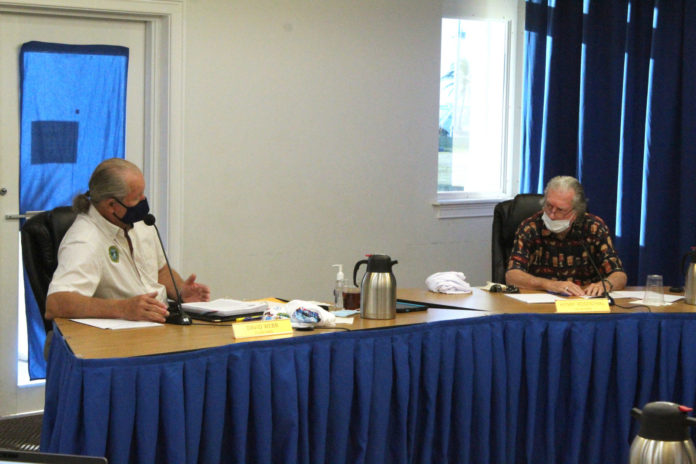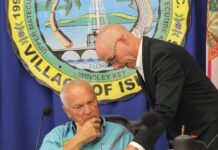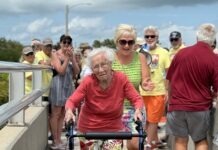
Growing vacation rentals and properties using their homes as an illegal business in the village of Islamorada have officials strengthening measures.
Council members unanimously supported a resolution to bolster the village’s vacation rental program during a Sept. 30 meeting inside the Founders Park Community Center. Annual licensing fees for the 260 properties that rent out for seven to 28 days will increase from $1,000, which was initially established in 2007, to $1,325 immediately.
Village Manager Greg Oravec told council members the increase, based on inflation, is a fair and logical way to adjust the fee without interrupting the current licensing cycle. An annual licensing fee of $1,325 is less than the Achievable Housing Advisory Committee’s recommendation of $2,500 with an additional fee of $500 for units with more than two bedrooms. Mayor Buddy Pinder said the fee increase was “generous.”
“I would personally like to see that be more, but this is a good starting point,” Pinder said.
Councilman Mark Gregg said he would like to see a portion of fees collected be directed to another larger problem facing the village in workforce housing. In his explanation, Gregg delved into a 2004 study that acknowledged a lack of affordable/workforce housing and its impact on Islamorada’s economic health and stability.
“When you take a house and turn it into a business, there’s a business impact,” he said. “Let’s put money on the table for affordable housing.”
In 2008, licenses issued during the first year of the village’s vacation rental program totaled 164. Today, that number stands at 260, and that doesn’t include the widespread issue of illegal vacation rentals.
Councilman David Webb said use of homes for vacation rentals is rampant in the village. Webb, who lives in Port Antigua, said his community is zoned single-family, or R1. That means renting anywhere from seven to 28 days isn’t allowed. He said he’s seen three-month renters.
“There are 300 homes and at least 30% of those homes are rented at one time or another,” Webb said. “Our neighborhoods aren’t supposed to be commercial operations.”
In addition to upping fees, the resolution approved by the council includes use of third-party software for a year to renew emphasis on code enforcement over vacation rentals. Members of the dais gathered information regarding Rentalscape during a presentation by Dustin Reilich, of Deckard Technologies, at a Sept. 2 meeting. Pinder and Village Attorney Roget Bryan met Reilich during a recent Florida League of Cities convention in Orlando.
With municipalities lacking information on short-term rentals come difficulties monitoring territory and enforcing ordinances. Through Rentalscape, municipalities are able to monitor and inspect local rental properties and track down unregistered properties. Reilich said the technology company, based out of San Diego, California, examines over seven million short-term rentals’ calendar activity each day.
“I have a team, once we’re under contract with Islamorada, that would end up going through and put eyes on every property to make sure it’s the right property,” he said. “We scrape all the major properties out there on AirBNB, VRBO and HomeAway, which accumulate for 97% of all short-term rentals that happen in the marketplace.”
Village staff will complete its evaluation of software options. Oravec told the dais during the Sept. 30 meeting that the village’s senior code compliance officer, Carlota de la Sierra, “can only do so much with her two eyeballs manually screening pages on the internet.
“Rentalscape will help a lot,” he said.
In addition, the resolution states that the village will test new GIS map layer technology for vacation rentals and provide feedback for improvements. Staff will also prepare an annual report on the state of vacation rentals in Islamorada.
In other matters, council members voted 5-0 to approve a contract to purchase property at 81981 Overseas Highway. Known as the Walgreens property, the dais directed village staff to make an offer in July. Key terms of the proposed contract include a purchase price of $2.75 million. The 2021 market value is $3.125 million, according to the Monroe County Property Appraiser. There would be a use restriction, meaning the property couldn’t be used to operate a gas station, convenience store or pharmacy.
“Under your ownership, it won’t be a 7/11 or something that doesn’t add to the community character of the village,” Oravec said.
With the council’s approval, village staff will proceed with an environmental assessment of the property. Barring any complications, the contract should close November or early December, Oravec said. Grading of the site for installation of temporary parking would commence, and so would a community-driven planning and design effort for the property’s long-term future.
A resolution ratifying a proposed collective bargaining agreement between the village and firefighters with the IAFF Local 4374 was approved by council members unanimously. The agreement is for three years beginning Oct. 1, 2021. Members will see base wages and salaries increase by 5% this year, 3% on Oct. 1, 2022 and 3% on Oct. 1, 2023.
The overall incremental cost of the salary increases, base pay and promotions, in the first year is approximately $290,769.51 over the current fiscal year. This amount is included in the proposed budget for the upcoming fiscal year beginning Oct. 1, 2021, through Sept. 30, 2022.
State lobbying service agreements were approved with the village’s two firms in GrayRobinson and Peebles, Smith and Matthews Inc. The village will pay a total of $123,000 for the two firms through fall 2022. GrayRobinson will received $75,000 from the village and Peebles, Smith and Matthews Inc., getting $48,000.
Originally grouped into the consent agenda, contracts for lobbying services were pulled by Councilman Henry Rosenthal for additional discussion. Rosenthal placed concerns over the lobbying firms and what transpired during previous councils, notably communication regarding the Founders Park Pedestrian Bridge proposed by the Florida Department of Transportation and word that canceling the project could jeopardize future state funding. Rosenthal motioned not to renew the contracts, but it wasn’t met with support from the other members of the dais.
Council members will gather for a regularly scheduled meeting on Oct. 14 at 5:30 p.m. at Founders Park Community Center.


























